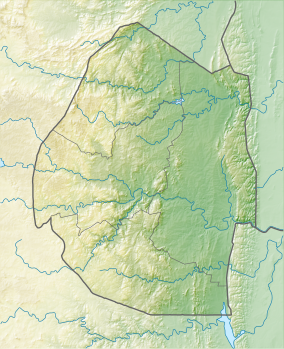Hlane Royal National Park
| Hlane Royal National Park | |
|---|---|
IUCN category VI (protected area with sustainable use of natural resources) | |
 Basic facilities at a hide overlooking Hippo Pool in the southern part of the park. | |
| Location | Eswatini |
| Coordinates | 26°15′0″S 31°52′48″E / 26.25000°S 31.88000°E / -26.25000; 31.88000 |
| Area | 300 km2 (120 sq mi) |
Hlane Royal National Park is a national park in Eswatini, roughly 67 km northeast of Manzini along the MR3 road.[1] Prior to being designated a public park, it was a private royal hunting ground.[1] Hlane, meaning 'wilderness',[2] was named by King Sobhuza II.[3] It is now held in trust for the nation by His Majesty King Mswati III,[3] and is managed by Big Game Parks, a privately owned body.[4]
Features
It is Eswatini's largest protected area[5] and park.[1] The park and its adjacent dispersal areas cover 30,000 hectares (300 km2) of Swazi bushveld.[3] It is a flat lowland area, covered with ancient hardwood trees like knobthorn, leadwood and tambuti, with some grasslands and shallow pans.[3]
Fauna
_in_the_lions_enclosure_..._(31656589284).jpg/440px-Lioness_(Panthera_leo)_in_the_lions_enclosure_..._(31656589284).jpg)
Hlane is home to populations of lion, elephant, South African giraffe, and white rhinoceros.[3] Wildebeest, zebra and impala herds are attracted to the waterholes during the dry winter months, June to September.[3] After a long absence, cheetah populations have been reintroduced in this park.
It has an abundant and diverse birdlife, including the highest density of nesting white-backed vultures in Africa.[3] Raptors include martial eagles, bateleurs, and long-crested eagles, as well as several species of vultures including white-backed, white-headed, lappetfaced and the occasional Cape vulture. The park is home to the southernmost nesting site of the marabou stork.[3] Some bird species, such as the southern yellow-billed hornbill (Tockus leucomelas), found here are either endangered or locally extinct in the country.[6]
Accommodation
A network of game-viewing roads crisscrosses the park's flat terrain. Accommodation is available in thatched huts and cottages at two different sites.[3] The main site is near the park entrance from MR3, Hlane Camp. The other site is Bhubesi Camp, almost at the northern end of the park. The road between them requires high clearance to navigate, so with a normal car, it is best to drive all the way around the park to get between them.
Transport
The park was bisected by the MR3 Highway in the 1960s, under pressure from sugar estates at the park's borders. They claimed that the highway would cause no environmental damage, but now hundreds of antelopes, wild boar, buffaloes, and other game are struck by vehicles each year.[7]
See also
References
- ^ a b c South Africa, page 815
- ^ "Swaziland - Hlane Royal Game Reserve". Game-Reserve.com. Retrieved 2009-10-08.
- ^ a b c d e f g h i "Hlane Royal National Park". biggameparks.org. Malkerns, Swaziland: Big Game Parks. Retrieved 2009-10-08.
- ^ "The Swaziland National Biodiversity Strategy and Action Plan, 1999". Environmental Centre for Swaziland. Archived from the original on 2011-07-28. Retrieved 2009-10-15.
- ^ Fitzpatrick, page 558
- ^ A Crash of Rhinoceroses http://www.geobeetles.com/eswatini-rhinos Retrieved 02/2020
- ^ Hall, James. "A Fierce Battle over Construction of New Road". Inter Press Service. Archived from the original on 2003-05-01. Retrieved 2009-10-19.
Sources
- Pinchuck, Tony (2002). South Africa. Rough Guides. ISBN 1-85828-853-3.
- Fitzpatrick, Mary (2004). South Africa, Lesotho & Swaziland. Lonely Planet. ISBN 1-74104-162-7.

